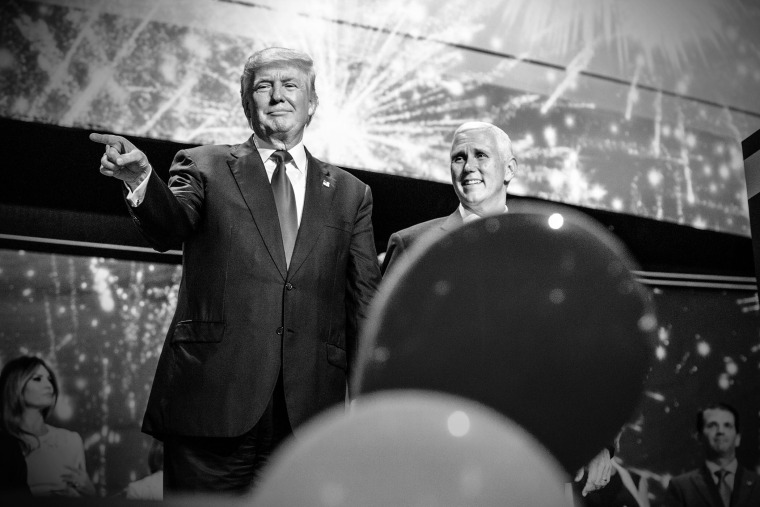Republican presidential nominee Donald Trump mentioned “trade” — in the form of deals, deficits or violations — more than a dozen times in his RNC acceptance speech Thursday night. “I’m going to turn our bad trade agreements into great trade agreements,” he declared, while also lambasting the trade deals struck by his rival Hillary Clinton.
Meanwhile, Trump’s running mate Indiana Gov. Mike Pence Pence has been a long-time proponent of “free trade,” including supporting the pending 11-country Trans Pacific Partnership. A schism between the Republican duo? Not really because they are debating something that doesn’t really exist.
The term “free trade” has simply been a marketing phrase. Who doesn’t like something “free” or want to “trade” — a term that evokes swapping baseball cards or recipes. In economics, the 19th-century English economist David Ricardo posited a theory in which countries would have a “comparative advantage” over each other in various industries. Those advantages, Ricardo argued, meant that each country should specialize in the industry in which it had relative strength, and trade for goods and services in other industries where it had no advantage. He viewed unrestrained international trade as always a net benefit. In other words, “free trade” without any barriers.
RELATED: Op-ed: TransCanada lawsuit highlights need to scuttle TPP
It is debatable whether Ricardo’s theory could ever play out even in a simpler marketplace 200 years ago. But, it certainly is a myth today. To be sure, trade deals oil the process, easing corporate decision-making. Today, however, capital moves at lightning speed across the globe. Countries don’t control their borders as far as the movement of corporate production. With or without trade deals, global corporations shift operations to countries where cost is lowest — not because of some Ricardoian national advantage of a smarter industry, invention or natural resource, but often in search of the most exploited, slave-like labor force.
A truly “free trade” deal could be written in three or four pages, calling for the elimination of all trade barriers. Instead, NAFTA, and every one of its progeny, are thick books of rules. In particular, intellectual property rights, such as drug company patents, are painstakingly defined. So, indeed, rather than “free trade” we have very carefully negotiated “managed trade” with plenty of barriers and special treatment protecting investors, capital and corporate rights.
Through that lens, we must also understand the truth about the labor and environmental provisions every “free trade” deal has contained dating back to NAFTA. When Bill Clinton needed every vote to squeeze NAFTA through a Democratically-controlled Congress, he and his then-vocally pro-NAFTA Labor Secretary Robert Reich came up with “side agreements” to address criticisms that NAFTA would obliterate jobs, fan the growth of exploitative, dangerous workplaces across the Mexican border and soil the environment. So, it is now tradition that every subsequent so-called “free trade” agreement has to contain some language on labor and environment.
Because the overriding motivation for “free trade” agreements is to outline corporate rights, the flimsy labor and environmental provisions, along with a relative pittance allocated to retraining workers who lost their jobs, are phony, unenforceable, political gestures.
RELATED: Bernie Sanders scores big wins with Democratic platform
To illustrate the point, consider that thousands of workers are injured and killed in the U.S. every year because our laws are inadequate to protect people on the job; as the AFL-CIO found, “it would take federal [Occupational Safety and Health Administration], on average, 140 years to inspect each workplace under its jurisdiction just once.”
In other words, we have an entirely inadequate system in this country just to watch over safety and health in the workplace, and, yet, voters are being implausibly told “free trade” agreements will ensure labor rights in countries with far more rickety regulatory systems.
Trade has roiled the nominating contests in both parties because voters aren’t fooled anymore by the phrase “free trade.” They are choosing sides on the issue not based on party affiliation but a perception that trade benefits elites and insiders not average people.
Trump, a billionaire who until his presidential campaign has arguably never shown any propensity to stand up for the average person, is not much different from Pence when it comes to a track record of favoring corporate rights over workers. That said, Trump has cleverly leveraged the issue to his advantage among certain voting blocs in the industrial heartland ravaged by managed trade.
By jettisoning illusionary concepts that cloud reality, we can build a consensus that the rules of trade must be changed, from the NAFTA model to a model that starts with a basic principle: Trade must, first and foremost, benefit workers and their communities.
From there, we can then get to the real question: What rules will manage trade to dictate how corporations can live up to principles that advance economic security and preserve the planet?
Jonathan Tasini, a national surrogate for Bernie Sanders and a convention delegate, is the author of "The Essential Bernie Sanders and His Vision For America." @jonathantasini
